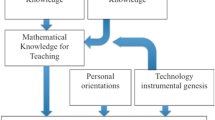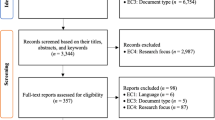Abstract
The structural organization, of the Danish Gymnasium greatly hinders cross-curricular activities. However, it is possible to integrate other subjects in the mathematics curriculum, not the least due to the existence of the so-called “aspects” I will discuss a particular course on modeling ozone depletion which was framed by the “model aspect”. The organization and outcome of the course are linked to three types of competencies mathematical. technological and reflective. I will focus on the reflective competency, in particular the criticla evaluation of mathematical models and their use. One conclusion is that modeling furthers all three competencies, and thus should be given more emphasis in mathematics instruction. However, if the reflective competency is to be furthered, the topic must be seen in a broader societal context, and this would be better supported by cross-curricular activities.
Kurzreferat
Die strukturelle Organisation eines dänischen gymnasiums behindert fächerübergreifende Aktivitäten enorm. Es ist jedoch möglich, andere Fächer in das Mathematikcurriculum zu integrieren, nicht zuletzt wegen der sogenannten “Aspekte”. Im folgenden wird ein spezieller Kurs zur Modellierung der Ozonzerstörung diskutiert, der in den Rahmen des “Modell-Aspekts” gestellt wurde. Organisation und Ergebnis des Kurses waren mit drei Kompetenzen verbunden, nämlich mathematischen, technischen und reflektiven. Die Betonung in diesem Beitrag liegt auf der reflektiven Kompetenz, insbesondere auf der kritischen Bewertung des mathematischen Modells und seiner Anwendung. Unsere Schlußfolgerung ist die, daß. Modellbildung alle drei Kompetenzen fördert. Deshalb sollte ihr im Mathematikuntericht ein viel größeres Gewicht beigemessen werden. Soll jedoch reflektive Kompetenz gefördert werden, so muß das Thema in einen breiteren gesellschaftlichen Kontext gestellt werden, was durch facherübergreifende Aktivitäten besser unterstützt würde.
Similar content being viewed by others
References
Austin, John L (1958): Performative—Constative—In: John R. Searle (Ed.), The Philosophy of Language—London: Oxford University Press, 1971 (Oxford Readings in Philosophy)
Bekendtgorelse (1990): Bekendtgorelse nr. 207: Bekendtgorelse om fagene m.v. i gymnasiet (Directive no. 207; Directive concerning the subjects etc in the gymnasium), Undrvisnings-og Forskningsministeriet, DGHF (The Ministry of Education and Research. The Directorate for the Gymnasium and the Higher Preparatory Courses) int 21240-90. (Record no. 21240-90) —Copenhagen. Denmark, March 23
Bishop, Alan J. (1988/91): Mathematical Enculturation—A Cultural Perspective on Mathematies Education—Dordrecht: Kluwer (Mathematics Education Library 6).
Boss-Bavnbek, Bernhelm (1991): Against Ill-founded, Irresponsible Modelling.—In: M. Niss, W. Blum; I. Huntley (Eds.). Teaching of Mathematical Modelling and Applications London: Ellis Horwood, p. 70–82.
Christiansen, Iben Maj (1996a): Mathematical Modelling in High School From Idea to Practice.—Revised doctoral dissertation Aalborg, Denmark: Department of Mathematics and Computer Science, Institute for Electronic Systems. Aalborg University (Text no. R-96-2030)
Christiansen, Iben Maj (1996b): Realizing Critical Reflections on Mathematical Models in the Classroom—Dream or a Realistic Idea?—In: T. Kjaergaard, A. Kvamme; N. Linden (Eds.), Political Dimensions of Mathematics Education III: Numeracy, Race, Gender, and Class. Proceedings of the Third International Conference Bergen 1995. Bergen: Caspar, p. 261–283.
Christiansen, Iben Maj (1996c): Stratospheric Mathematics: Sharing experiences from a high school course on modelling ozone depletion Paper presented at ICME-8 in Sevilla, Spain. July 1996: Department of Mathematics and Computer Science, Aalborg University, Denmark
Christiansen, Iben Maj (1997): When Negotiation of Meaning is also Negotiation of Task: Analysis of the Communication in an Applied Mathematics High School Course—In Educational Studies in Mathematics Vol. 34(1), p. 1–25.
Christiansen Iben Maj (1998): The Effect of Social Organization on Modelling Activities.—In: P. Galbraith; W. Blum; G. Booker: I. Huntley (Eds). Proceedings of ICTMA-8, Brisbane, Australia. forthcoming
Ernest, Paul (1991): The Philosophy of Mathematics Education. —London: The Falmer Press.
Hirsberg, Bent; Hermann, Kirsten (1991) Mathematical Models and Modelling Examples from Danish Upper Secondary Teaching—In: M. Niss; W. Blum, I. Huntley (Eds.), Teaching of Mathematical Modelling and Applications London: Ellis Horwood, p. 179–186.
Niss, Mogens (1984): Kritisk matematikundervisning—nodvendig men vanskelig.—In: Unge Pædagoger (No. 4), p. 21–29
Niss, Mogens (1990): Matematiske modeller, almendannelse og demokrati.—In: Statens Humanistiske Forskningsråd, Initiativet vedrorende Matematikundervisning, Matematikundervisning og Demokrati—Rapport fra en konference afholdt 14–16. juni 1990 i Gilleleje Roskilde: IMFUFA, Roskilde University Center, p. 67–75.
Skovsmose, Ole (1990): Reflective Knowledge: Its relation to the mathematical modelling process.—In: International Joural of Mathematical Education in Science and Technology Vol. 21(5), p. 765–779.
Skovsmose, Ole (1993): Towards a Critical Mathematics Education. —In: C. Julie; D. Angelis, Z. Davis (Eds.), Political Dimensions of Mathematics Education 2: Curriculum Reconstruction for Society in Transition. The National Education Coordinating Committee Mathematics Commission. Cape town: Maskew Miller Longman, p. 91–106.
Skovsmose, Ole (1994): Towards a Philosophy of Critical Mathematics Education—Dordrecht: Kluwer (Mathematics Education Library, 15)
Solomon, Susan (1990): Progress towards a Quantitative Understanding of Antarctic Ozone Depletion.—In Nature Vol. 347(6291), p. 347–354.
Vithal, Renuka; christiansen, Iben Maj, Skovsmose, Ole (1995): Project Work in University Mathematics Education: A Danish Experience: Aalborg University.—In Educational Studies in Mathematics Vol. 29(2), p. 19–223
vom Hofe, Rudolf (1995): Grundvorstellungen mathematischer Inhlte.—Heidelberg: Spektrum Akademischer Verlag (Texte zur Didaktik der Mathematik)
Author information
Authors and Affiliations
Additional information
Part 2 will be published in ZDM 30 (1998) No. 4.




